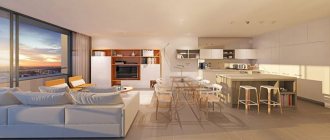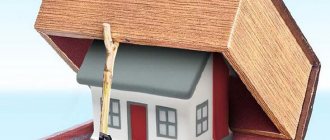The elegant word “apartment” is increasingly heard in the real estate market. Developers are offering to buy apartments rather than apartments, attracting people with their low price and good location in a new area of the city. This option has the right to life only if the buyer has found out what is the difference between an apartment and an apartment, and whether he is satisfied with such real estate.
Briefly: Apartments differ from apartments in that legally they are non-residential real estate - with all the features arising from the law.
The main differences between apartments and apartments
The main difference between apartments and apartments is the letter of the law. Legally, an apartment is a residential premises, but apartments are not classified as residential real estate. Because of this, a lot of legislative nuances arise that directly affect apartment owners. These include the specifics of registration in apartments, tax specifics, and the nuances of managing common property. Let's look at all these points in today's article.
It is interesting that in Russian legislation, issues related to housing are regulated by the Housing Code and special rules. Monitoring compliance with the law in relation to apartments is carried out by the local housing inspectorate - if the rights of the owner are violated, he can always seek administrative or judicial protection and receive a completely unambiguous answer.
This does not apply to apartments. Today in Russia there are no special laws on apartments, and judicial practice differs not only across the country, but also across the region. Solving the owner's problems falls entirely on his shoulders.
REMEMBER: If the documents say that the property is an apartment (apartments), this is a non-residential premises, and laws relating to housing cannot be applied to it.
What if the apartments are located in a residential complex?
Often developers advertise their buildings without advertising that these are non-residential apartments. Such premises may be located in a residential complex specially equipped for permanent residence. However, the presence of sewerage and heating, elevators, common areas, and internal infrastructure for housing does not make such a complex a residential apartment building (MKD). You need to look at the documents, if it says “non-residential”, no residential infrastructure around will change this fact.
A family with small children permanently lives in the apartment - isn’t this housing?
No, the composition of the family living in the premises does not in any way affect the legal status of the apartment. They will be different from a residential apartment in the same way as if no one lived there permanently, or if it was used for temporary rental or other commercial purposes.
What are apartments for then?
In fact, apartments can be used for a variety of purposes:
- for permanent residence, but taking into account differences in status from an apartment;
- for organizing a hotel, apart-hotel;
- for rental to temporary residents without organizing a hotel;
- for any commercial purposes: for example, organizing a showroom, store, office.
As a rule, if a buyer is initially looking for commercial premises, he is not interested in how apartments differ from apartments. But if you are choosing housing for your family, you need to take into account a lot of features, which are described in detail below.
What is an apartment
Everyone can easily imagine an apartment. This is a separate room with a separate entrance, consisting of one or more rooms, located in an apartment building and purchased by individuals or legal entities. The purpose of purchasing an apartment is to live in or rent it out. The standard apartment layout includes a kitchen, living rooms, and a bathroom.
The main features of the apartment are the following:
- isolation, which means that each owner has a separate entrance to the house;
- the presence of one or more bedrooms;
- the presence of auxiliary premises to ensure the convenience of living (bathroom, kitchen, hallway).
The main characteristic of an apartment as a real estate property is the total and living area. According to the documents, the total area is summed up based on the number of heated and unheated premises, which are calculated according to certain coefficients. The values of the coefficients are determined by the rules of technical inventory.
The living area refers to that part of the apartment that is intended for living. In regulatory documents, however, there is no precise definition of living space and a method for calculating it. The living area of the apartment does not include: balcony, loggia, storage room and other unheated rooms.
Apartment design and price
A big plus of apartments, which distinguishes them from apartments, is the reduced price. Commercial non-residential real estate is cheaper than residential real estate of the same size.
Purchasing an apartment is not much different from purchasing an apartment. They can be purchased at:
- purchase and sale agreement;
- agreement on shared participation in construction;
- assignment agreement.
Exchange agreements can also be concluded for apartments. Like apartments, apartments can be inherited and bequeathed; there are no restrictions in this regard in the law.
However, savings of even 1-2 million rubles can result in subsequent problems for the apartment owner if he purchases them instead of an ordinary apartment with residential status.
Will the stingy pay twice: how much will it cost to pay for housing and communal services?
All good things come at a price. And the first confirmation of this will be receipts for housing and communal services. They will cost owners an average of 18% - 20% more. Will such a tariff pay off and will the constant overpayment negate the one-time benefit from the acquisition? If the purchase was made for permanent residence, the difference will be quite noticeable.
Increased tariffs apply only to certain services - electricity, water, sewerage and sewerage. Most of all - 36% more expensive, you will have to overpay for electricity, and the cost of water supply services will be higher than for residential premises, by 12%.
For a large family, utility costs may well become a serious expense item. However, such markups do not confuse all buyers - some of them invest in additional real estate, taking advantage of today's cheap prices and expecting a further rise in prices. Others use them as a commercial project, renting them out and shifting the payment of meters to the tenants.
Redevelopment and reconstruction
Apartments differ from apartments in that the layout in them can be more free - due to the absence of mandatory construction requirements, as for housing. You can simply purchase a large area without internal partitions and then build your own walls that will be convenient for a particular family.
In the future, reconstruction and redevelopment, including the relocation of, for example, plumbing fixtures, will be much easier to carry out and formalize, again due to the lack of strict legal standards.
In addition, for a lower price you can get apartments in a more attractive area than apartments - due to the fact that developers choose land plots for different purposes, including for business development, and not just for housing construction.
Apartments are usually cheaper than apartments when compared by size, layout, and location. But savings can deprive a number of social benefits and privileges of a homeowner.
Cheap housing, expensive housing and communal services
The popularity of apartments is due to their low cost. “In projects with similar characteristics, the cost per sq. m of apartments are usually lower than the price of sq. m. m of apartments by 20-25%. Today the average price per sq. m of apartments in Moscow is 213 thousand rubles, the minimum is 100 thousand rubles. per sq. m,” explained the head of the analytics and consulting department Elizaveta Gudz . The low price is due to other requirements that apply to such objects. According to Sofia Lebedeva, general director of MIEL-Novostroika , the standards for the construction of non-residential premises, in particular for sound and heat insulation, insolation (lighting), as well as for the provision of social infrastructure, during the construction of apartments are less stringent than for conventional residential complexes." .
Another feature of apartments is the higher cost of utility bills. “According to their legal status, apartments are non-residential premises, hence the higher tariffs, which usually differ by the VAT rate. Payments for water will be higher by 10%, for heat – by 25%, electricity will be more expensive by 27% (based on the average tariff of 2.5 rubles/kWh). In absolute monetary terms, the monthly rent for apartments with an area of 80-100 sq. m will be higher than that of an apartment of the same area, by about 2-2.5 thousand rubles. At the same time, apartment sellers assure that the discount that the buyer receives when making a transaction covers the difference in payments for many years to come,” notes Olga Khasanova, development director of the urbanus.ru portal.
Article on the topic
Women's apartment. What is it like, the dream house of a modern Russian woman
Tax deductions for the purchase of apartments
Property deductions for the purchase of housing (2 million rubles) and mortgage interest (3 million rubles) do not apply to apartments. You can apply for a personal income tax refund only when purchasing an apartment, room, house or shares in them. Apartments are not included in this list; they are distinguished by the fact that in the documents they have the status of “non-residential”. Therefore, even if they are located in a residential area or are actually used for living, the tax office will refuse the deduction.
Converted to rubles:
- for an apartment worth 3 million rubles, you can return 260 thousand rubles at the expense of personal income tax - without taking into account the deduction for mortgage interest and the redistribution of rights between spouses;
- For apartments of the same cost, you won’t be able to get a penny back from the budget.
It turns out that apartments differ from apartments in that it will not be possible to receive a personal income tax refund for their purchase.
A few real stories:
Review of purchased apartments in an expensive modern complex. Duration of tenure (residence) is 1 year.
The difference in rent compared to ordinary housing, which is talked about so much, really does exist, but not on all counts. For example, electricity tariffs are higher , and water and sewerage charges are approximately the same as in “municipal” houses in the area.
True, “ it is almost impossible to check expenses in this case. Since this is a commercial premises, you cannot complain to the housing inspector about the quality of services. In principle, the dictates of the management company are felt very strongly: the Internet is theirs alone, television too.
Builder defects are not corrected under warranty - there are no funds for repairs. If this management company goes away, then everything that has been accumulated now, at the first stage, will disappear and you will have to repair the house at your own expense.
There are no smoking areas in our apart-hotel . Previously, these were provided, but then closed due to technical difficulties. If you smoke right in your “room”, the smoke will flow through the ventilation to your neighbors . Now people have to quietly smoke on the back stairs, which can lead to a fine or conflict with security. In response, they may prohibit driving a car to the entrance to the building without a pass, which is not easy to obtain, since there are no official parking spaces for the apartments.”
“However, the main problem with the apartments is poor sound insulation . In commercial premises, the requirements for it are low, so noisy neighbors and barking dogs can be clearly heard in nearby rooms.”
Nowadays people buy apartments mainly not for their own residence, but for business.
They have also become a new type of investment in real estate. If previously, with several million rubles, people simply deposited money in the bank, but now there is an alternative to receive not just interest on the deposit, but income from the rental business.
Advanced investors have understood the true profitability of apartments, and developers have adjusted to their expectations. As a result, complexes have appeared in which the management company accompanies the owners of the premises on a turnkey basis - equipping rooms, looking for tenants, cleaning and other types of maintenance . The owner receives his 25 thousand rubles per month on the card and does not face any difficulties, as is the case with renting out a simple apartment.
Property tax
Almost all of Russia has switched to calculating property taxes based on cadastral value, so we will make an approximate calculation based on it. Owners of both apartments and apartments, from the moment of registration of rights in Rosreestr, receive the obligation to pay property tax annually before December 1. Despite the fact that in fact apartments are not much different from apartments, the tax calculation for them will be different.
Property tax is calculated as the cadastral value of the premises minus the deduction multiplied by the tax rate:
- The cadastral value of the apartment itself may be lower than the cadastral value of the apartment, or it may be higher - the difference depends on the specific apartment. You need to look at the cadastral value in the extract from the Unified State Register of Real Estate.
- A deduction is the amount by which the cadastral value of the premises is reduced. For apartments, the Tax Code of the Russian Federation establishes a deduction in the amount of the cost of 20 square meters of apartment. That is, for an apartment of 70 square meters, you need to subtract the cost of 20 square meters from the total cadastral value - we get the cost of 50 square meters. m. and we will calculate the tax from it. There is no such deduction for apartments; you will have to count from the full cost.
- The tax rate is determined by the region where the premises are located. As a rule, for apartments it is 0.1%, and for apartments – 0.5%. That is, the tax rate for apartments differs from that of an apartment by a factor of five.
Will the apartments be converted into housing stock?
So far, the idea of equating apartments to apartments exists only in the form of a legislative initiative. In January 2021, a decree of the Government of the Russian Federation was adopted to determine the legal status of this real estate and establish the possibility of registration in it.
It is planned to submit the corresponding draft law to the government in September of this year, and to the State Duma in October. If the deputies approve the initiative, perhaps already in December 2021 the apartments will be converted into apartments, that is, they will be given the appropriate legal status. However, all this is just perspective.
“If you need permanent registration, it is better to postpone the option of purchasing apartments until the legal status of the property is finalized,” advises lawyer Daria Morozova.
pixabay.com/Pexels
State support, maternity capital and benefits
Apartment owners are provided with a full list of state support programs, the use of maternal capital, and various housing benefits. Unfortunately, these opportunities do not apply to apartment owners:
- you cannot participate in state support programs (young family, military mortgage or mortgage with state support);
- it is impossible to buy apartments using maternity capital, because this is not housing;
- If a federal or regional benefit is provided to homeowners, it does not apply to apartment owners.
You can only count on special, usually commercial, programs to support property owners. At the federal level, such programs do not yet exist, but in the regions they relate to tax benefits (as in Moscow).
Prices are unbeatable
The entrance fee to the first type apartment market is high, but not prohibitive. Thus, in the new ArtStudio complex (Central District) of the RBI holding, the cost of apartments with an area of about 30 square meters. m will amount to 7.5 million rubles. And in the Grani apartment complex in the Petrogradsky district from the Construction Trust for a one-room option of 42 sq. m they are asking for about 6 million. If you look for a new residential building of the same class in the center or on Petrogradka, the price tag will most likely be at least a couple of million higher.
Much lower prices in apartments of the second type - service apartments
At the same time, service apartments are also being built in quite popular and prestigious areas of the city: Central (YE'S on Sotsialisticheskaya from the Pioneer Group of Companies), Vasileostrovsky (as part of the MFC “Bright World “I am a Romantic...””, both - Seven Suns Development), Vyborgsky (Vertical We&I is a new project of Becar Asset Management Group), etc.
You can buy these apartments for less than an apartment in densely populated Murino (Lenoblast). Thus, in the “Bright World “I am a Romantic...”” apartments with an area of 21 square meters are offered. m for 1.3 million rubles. Rooms in Vertical We&I are available for 1.9 million, however, the area will be extremely low - from 13.3 sq. m. However, all apart-hotels should not be treated with the same brush. Thus, in the YE'S apart-hotel on Socialistheskaya Street, for an object with an area of 19 sq. m they are asking for significantly more - 3.6 million rubles, but still this is 20-30% cheaper than in residential complexes in the same Central District, where, moreover, small-sized apartments are in short supply (this also applies to secondary housing).
Mortgage for the purchase of apartments
Unlike apartment buyers, future apartment owners cannot obtain a mortgage with state support. The “Mortgage with state support at 6.5%” program, popular during the coronavirus pandemic, is focused only on apartments – under construction or ready-made. The same can be said about any other state programs for subsidizing mortgages: for families with children, military personnel, doctors and teachers (in the regions), and so on.
However, banks still issue mortgages for the purchase of apartments - as a rule, within the framework of a special program (for apartments), a loan for finished real estate or a mortgage secured by existing other real estate. The rate on such a mortgage will be higher than on preferential programs, but still quite acceptable, around 11-12%.
The apartments are not subject to any government support programs, including preferential mortgages or maternity capital. But banks issue loans under other programs at higher rates.
Is it worth buying an apartment?
To answer this question, it is important to understand exactly the purpose of purchasing real estate. The purchase will be profitable for people who plan to rent out apartments or are simply on a limited budget and cannot afford to buy a full-fledged home. However, this benefit is noticeable only for objects at the construction stage. Resales can be both cheaper and more expensive than housing stock. For example, in some areas of Moscow the price of apartments is 40% higher than the cost of apartments. To a greater extent, choosing apartments is justified as an investment.
“Today apartments are an interesting product from the point of view of investment attractiveness,” comments Daria Morozova. — When they are transferred to housing status, the price difference that exists today will be completely leveled out. If you are thinking about purchasing, it is better to do it now, at current prices, as the cost will increase in the near future.”
Registration at place of residence
Unlike an apartment, you cannot register in an apartment on a permanent basis. Registration at the place of residence in non-residential premises is not permitted. In some cases, you can register temporarily for 5 years, but this opportunity depends on the specific building in which the apartments are located. If this is an office building, they will refuse even temporary registration.
Permanent registration (registration) in the apartments is not possible, and temporary registration is allowed only in some cases - it all depends on the type of building in which the apartments are located.
Legal status and registration issue
All that apartment owners can do to somehow indicate their rights to real estate is to issue a temporary registration for a period of five years. At the end of the specified period, you must renew your registration again. Without registration, you, like apartment residents, will be able to visit the clinic and use the services of general education institutions.
For example, at school, classes will be formed first from among the children who are registered in the apartment, then from all the others.
House management, utilities and maintenance of common property
The issues of living in apartments are actually no different from living in an apartment - utilities, maintenance of common staircases, basements, attics and elevators, solving general house problems, cleaning, and so on are also necessary. If in an apartment building many issues are regulated by the Housing Code, then for apartments there is no such law. Even if the building contains only apartments in which families live, all-Russian housing rules do not apply to them. In other words, the owners always decide for themselves what to do with the common property.
Major renovation
A non-residential building with apartments is not included in the capital repair system operating in the region. Any repairs to the building, which could be done in an apartment building using funds from the capital repair fund, in the case of apartments falls on the shoulders of all owners. At the same time, it will be quite problematic to force one of the owners to pay for major repairs - after all, there is simply no law that would oblige owners to participate in the management of common property.
Until the legislation regulates the issues of managing buildings with apartments. Their owners may have problems solving the most common issues with maintenance and major repairs.
Communication with neighbors
Apartments, unlike apartments, are not subject to the requirements of the law on silence. Each region has its own rules - do not make noise at certain times of the day and do not allow too much noise. Residents of apartments are not protected by such rules. Therefore, even if the neighbors behave impudently, it is inappropriate to invoke the laws on silence here.
In addition, any apartment owner can not only live there with his family, but also, for example, open a hotel, store or any other business on the premises. It will not be possible to force him to close the case, unlike the owner of the apartment.
Social explosions
The position of the Moscow authorities regarding the apartments was announced by the chief architect of the capital Sergei Kuznetsov in February. He proposed dividing apartment projects into two types - housing and hotels, and providing all the necessary infrastructure. In the future, the city government plans to oblige developers to include it in the project during construction. The chief architect of the capital mentioned the social explosions associated with apartments that have already occurred in Moscow: “People who bought apartments are en masse demanding social infrastructure from the city. They say: “We live in the city, we pay taxes, so why are we worse than those people who live in normal houses? The state did not explain to us that we did not have to buy apartments and live here with children.”
Article on the topic
Twenty meters and a window. Pros and cons of studio apartments
Checklist for apartments
Differences between apartments and apartments:
- Legally, apartments are non-residential real estate - with all the features arising from the law.
- If the documents say that the property is an apartment(s), this is non-residential premises, and laws relating to housing cannot be applied to it.
- Apartments are usually cheaper than apartments when compared by size, layout, and location. But savings can deprive a number of social benefits and privileges of a homeowner.
- There is no tax deduction for the purchase of apartments. Most likely, the tax obligations of the apartment owner will differ significantly from the amount of taxes that the owner of a comparable apartment will be required to pay.
- The apartments are not subject to any government support programs, including preferential mortgages or maternity capital. But banks issue loans under other programs at higher rates.
- Permanent registration (registration) in the apartments is not possible, and temporary registration is allowed only in some cases - it all depends on the type of building in which the apartments are located.
- Until legislation regulates the management of apartment buildings, their owners may have problems solving the most common issues with maintenance and major repairs.
If you have any questions about the topic of the article, leave comments. And you can get legal advice from a specialist for free, contact us via chat or by phone.
Renovar.ru Author: Ksenia Paltseva
Use of real estate
Apartments are intended for living, and business can be opened in them only with the consent of other owners. But even in this case, the entrepreneur must conduct business in such a way as not to disturb other residents.
There are no such rules for apartments - this is commercial real estate, so you can legally place an office, hostel or nightclub in a neighboring apartment without the consent of other residents.
For example, if you live in an apartment and your neighbors are noisy at night, you can legally complain about the noise. There is no point in complaining in an apartment, even if a children's choir is rehearsing behind the wall at three in the morning.
Because of this, individual management companies now include a clause in the contract stating that you can only live in the apartments, but not conduct business.
Purchase price
The land on which the apartment complexes are being built is allocated for the construction of hotels and public and business facilities - for example, shops, pharmacies and cafes. Due to this, apartments on the market of new buildings are 10-30% cheaper than apartments.
If we talk about secondary real estate market objects, apartments can be both cheaper and more expensive than apartments - it all depends on the location.
Convenience of location
Unlike new-build apartments, apartments are built mainly in well-maintained areas with developed infrastructure. They are often located near the metro and office centers, industrial zones or scientific clusters, from where comfortable travel to the center and back is available.
Infill development is also allowed for apartments; they can be located in reconstructed buildings and unusual locations - where residential real estate cannot be built.
Infrastructure
When constructing apartments, the developer is obliged to provide the area with infrastructure - build a kindergarten, clinic and school. Apartments are not residential properties and are not provided with social infrastructure.
But since apartments are often located in the center, they have their own infrastructure. In the apartment complex itself or in nearby areas there may often be restaurants, laundries, shops, beauty salons, and even fitness centers with a swimming pool.
In addition, when designing many apartments, the developer takes into account the needs of future residents and plans areas for kindergartens, medical institutions, etc.
Registration
You cannot register in the apartment - you can only get temporary registration. However, with it, the resident will still have access to all the necessary services: you can officially get a job, issue a regular and international passport, get a Taxpayer Identification Number (TIN) and a pension certificate, enroll your children in a kindergarten or school, take out a loan, call a doctor and enroll in a clinic. The only difference is that temporary registration will need to be renewed after 5 years.
But it is worth considering that registration is issued only for apartments in hotel or office buildings. If the apartment is located in the business center, registration will not be possible.
Property tax
The real estate tax rate is calculated based on the cadastral value of the property - the amount at which the state values your apartment. The tax on apartments ranges from 0.1 to 0.3% per year. Apartment tax is from 0.5 to 2% per year.
The exact rate depends on the purpose of the property - a rate of 0.5% is applied to hotel-type apartments. The highest rates are for apartments located in administrative, business or retail buildings.
Despite the higher rate for apartments, their cadastral value is lower than that of apartments. Therefore, the tax for owners of apartments and apartments of similar size is not much different.
Tax deduction and subsidies
When purchasing an apartment, you can receive a tax deduction of up to 260 thousand rubles, as well as up to 390 thousand rubles on mortgage interest. When purchasing apartments, you cannot receive a tax deduction.
In addition, apartments are not covered by preferential mortgage programs, and the use of government subsidies and maternity capital is prohibited. You can count on a regular mortgage or installment plan - bank mortgage programs for apartments and apartments are almost the same.
Utility bills and maintenance
Utility tariffs in apartments are 15-20% higher. Payments are calculated at rates for non-residential premises, which are higher in themselves. Also, these tariffs are regulated not by the state, but by commercial services - the agreement is concluded between the owner and the developer’s management company, HOA or other form of management.
The cost of operation depends on the tariffs of the specific management company and the class of the new building. In economy and standard class apartments, the cost of operation is 80-100 rubles/sq.m. This typically includes trash removal, janitorial services, plumbing and electrical services, maintenance of major building systems, etc.
In luxury apartments, the list of services of the management company can be very long and include options of any degree of exoticism - a cook, a gardener, a concierge service, a dog walker, a butler, and basically anything.
Major renovation
All apartment owners are required to make payments for major repairs of the building. The amounts of contributions are set by the municipal authorities of the region.
Apartment owners are not required to contribute funds for the repair of common property. However, one day the building will need repairs, and if the management company does not agree with the residents on the systematic formation of the general fund, they will have to pay a lot at once.
Comparison of payments for major repairs for an apartment and apartments with an area of 50 m²
Seizure for debts
It is difficult to seize an apartment from the owner, even if he does not pay for utilities. This can only be done through the court.
With apartments, everything is different - since this is commercial real estate, it is considered a simple asset that can be seized and put up for auction. This means that in the event of the debtor’s insolvency, the social tenancy agreement will be terminated, the apartment will be seized, and the debtor will be evicted, even if this is his only home.
What to choose - apartment or apartment
An apartment is better suited for resale and for living. Let the price be higher, but the difference will be paid off due to the amenities that the owners will receive - infrastructure, the possibility of registration, a clearer legal status of housing. In addition, the target audience of the apartment is wider, and selling it is faster and easier.
For rent and investment, you should choose apartments. The entry threshold is lower, the rental price is comparable to an apartment. Apartments often have a more convenient location than apartments; they are often delivered turnkey, which makes them more attractive in terms of profitability.










